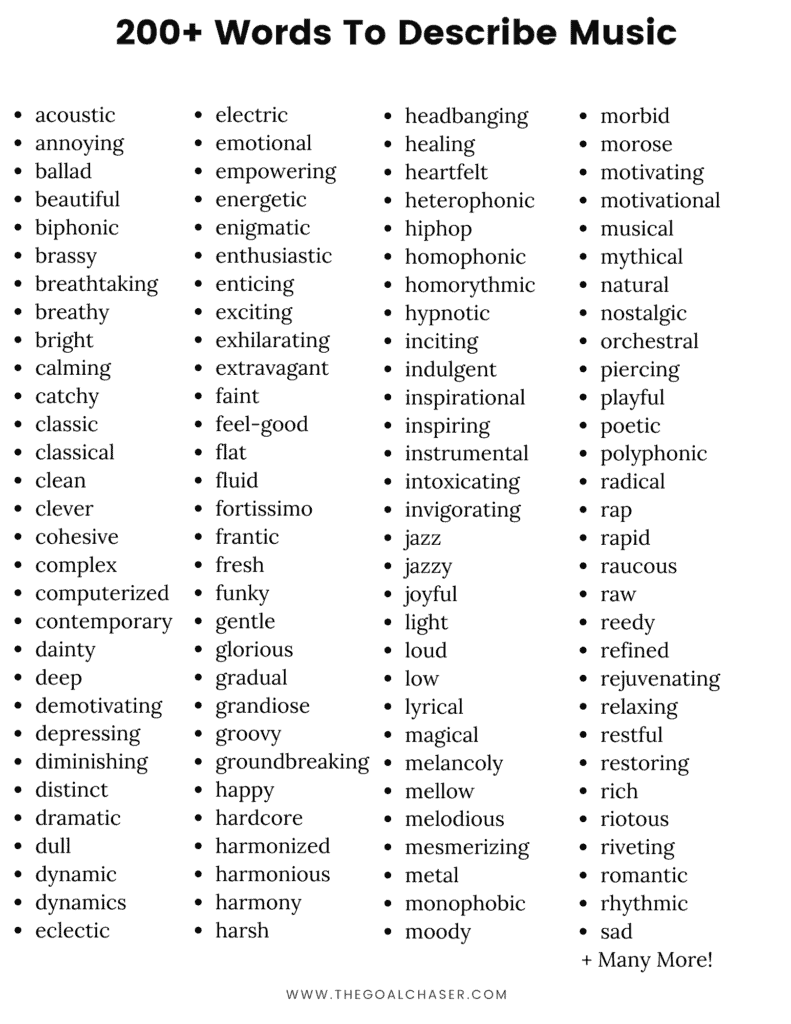200+ Words To Describe Music – Adjectives For Music
An epic list of words to describe music.
Music brings so much joy to life. Whether you create it yourself or enjoy listening to live or recorded music.
And the English language is a rich and varied one, but what words do we use to describe music?
There are many adjectives (describing words) that can be used to help explain the thoughts and feelings that music can conjure up in us, but here we have listed some of the more common ones.
As you will see there are many words that overlap in meaning or can be used in different contexts, for example, the genre, an individual piece of music, our opinion and how it makes us feel.
How To Describe Music
When we describe music, we usually think about the following factors:
- rhythm, beat, tempo
- tone, texture, melody
- vocal style and form (e.g. spoken word, rap etc.)
- lyrics and poetic devices used in lyrics such as rhyme and metaphor
- the mood, or emotional effects of the music (e.g. happy or sad)
- cultural references to styles
Music Words to Describe Genres of Music
When we describe genres of music, they usually fit into the following categories of:
-
- Alternative – genre of music that emerged in the late 1970s as an alternative to mainstream rock and pop.
- Ambient – music that emphasizes atmosphere and texture over traditional musical structures, often featuring slow, repetitive patterns and electronic instrumentation.
- Baroque – a style of classical music that originated in the 1600 to about 1750, characterized by elaborate ornamentation, complex harmonies, and dramatic contrasts.
-
- Bluegrass– genre of American folk music that emerged in the mid-20th century, featuring acoustic stringed instruments (such as the banjo, mandolin, and fiddle) and close vocal harmonies.
- Blues – a genre of music that originated in African American communities in the Southern United States, featuring simple chord progressions, soulful vocals, and lyrics that express themes of love, loss, and hardship.
- Ceremonial – performed in a ritual or ceremonial context, often featuring repetitive rhythms and chants.
-
- Choral – a type of music that is written for and performed by a choir, often featuring complex harmonies and multiple vocal parts.
- Classical – a genre of Western art music that originated in the late 18th century, characterized by formal structures, complex harmonies, and the use of orchestral instruments.
- Country – genre of music that originated in the Southern United States, featuring acoustic and electric instruments, simple chord progressions, and lyrics that often focus on themes of love, heartbreak, and rural life.
-
- Cultural – music that is associated with a particular cultural or ethnic group, often featuring traditional instruments and styles.
- Disco – dance music that originated in the 1970s, characterized by a four-on-the-floor beat, funky basslines, and soaring vocals.
- Easy Listening – music that is designed to be soothing and relaxing, often featuring lush arrangements and soft vocals.
-
- Electric – music that features electric instruments (such as guitars and keyboards) and amplifiers, often characterized by a high level of distortion and energy.
- Electronic – music that is created using electronic instruments and technologies, often featuring repetitive beats and intricate soundscapes.
- Folk – a genre of music that emphasizes storytelling and acoustic instrumentation, often featuring simple chord progressions and traditional melodies.
-
- Gospel – a genre of Christian music that features soulful vocals, call-and-response singing, and lyrics that express themes of faith and redemption.
- Heavy Metal – rock music that is characterized by distorted guitars, aggressive vocals, and fast, driving rhythms. Designed to be played loud.
- Hip Hop – music that originated in African American and Latinx communities in the United States, featuring rap vocals, beats created using drum machines and samples, and lyrics that often address social and political issues.
-
- Indie – genre of music that is produced independently of major record labels, often featuring lo-fi production values and a DIY ethos.
- Instrumental – music that features no vocals, instead emphasizing the instrumental melodies and rhythms.
- Jazz – music that originated in African American communities in the United States, featuring improvisation, complex harmonies, and rhythmic interplay between musicians.
-
- Latin – music that originated in Latin America, characterized by lively rhythms and upbeat melodies.
- New Age – music that emerged in the 1980s, characterized by soothing, meditative instrumentation and a focus on spiritual and environmental themes.
- Opera – a form of classical music that originated in Italy in the late 16th century, characterized by vocal music and elaborate stage productions.
-
- Pop – A genre of music that is characterized by catchy melodies, upbeat rhythms, and lyrics that often focus on love and relationships.
- Progressive Rock – rock music that emerged in the late 1960s and early 1970s, featuring complex musical structures, unusual time signatures, and sophisticated instrumentation.
- Punk – A genre of rock music that emerged in the mid-1970s, characterized by fast tempos, aggressive vocals, and lyrics that often address social and political issues.
-
- Rap – featuring rhythmic vocals that are spoken or chanted over beats created using drum machines and samples.
- Reggae – a genre of music that originated in Jamaica in the late 1960s, featuring syncopated rhythms and lyrics that often address social and political issues.
- Religious – a genre of music that is associated with a particular religious tradition, often featuring hymns, spirituals, or other sacred music.
-
- Renaissance – a style of classical music that originated in Europe during the Renaissance period, characterized by polyphonic textures and vocal harmonies.
- Rhythm and Blues – a genre of music that originated in African American communities in the United States in the 1940s, featuring soulful vocals, bluesy guitar riffs, and a strong rhythmic pulse.
-
- Rock – a genre of music that emerged in the United States and United Kingdom in the 1950s and 1960s, characterized by electric guitars, driving rhythms, and lyrics that often address themes of rebellion and youthful angst.
- Soul – music that originated in African American communities in the United States in the 1950s and 1960s, featuring passionate vocals, bluesy melodies, and a strong emphasis on rhythm and groove.
- Spiritual – music that is associated with religious traditions, featuring call-and-response singing, spirituals, and gospel music.
Words to Describe Music
When we want to either explain a piece of music to others, or when we want to describe how music makes us think, feel and act, we can use some of the following adjectives (describing words):
-
- acoustic
- annoying
- ballad
- beautiful
- biphonic
- brassy
- breathtaking
- breathy
- bright
-
- calming
- catchy
- classic
- classical
- clean
- clever
- cohesive
- complex
- computerized
- contemporary
-
- dainty
- deep
- demotivating
- depressing
- diminishing
- distinct
- dramatic
- dull
- dynamic
- dynamics
-
- eclectic
- electric
- emotional
- empowering
- energetic
- enigmatic
- enthusiastic
- enticing
- exciting
- exhilarating
- extravagant
-
- faint
- feel-good
- flat
- fluid
- fortissimo
- frantic
- fresh
- funky
- gentle
- glorious
- gradual
- grandiose
- groovy
- groundbreaking
-
- happy
- hardcore
- harmonized
- harmonious
- harmony
- harsh
- headbanging
- healing
- heartfelt
- heterophonic
- hip-hop
- homophonic
- homorhythmic
- hypnotic
-
- inciting
- indulgent
- inspirational
- inspiring
- instrumental
- intoxicating
- invigorating
-
- jazz
- jazzy
- joyful
- life-changing
- light
- loud
- low
- lyrical
-
- magical
- melancholy
- mellow
- melodious
- mesmerizing
- metal
- monophonic
- moody
- morose
- motivating
- motivational
- musical
- mythical
-
- natural
- nostalgic
- orchestral
- piercing
- playful
- poetic
- polyphonic
-
- radical
- rap
- rapid
- raucous
- raw
- reedy
- refined
- rejuvenating
- relaxing
- restful
- restoring
- rhythmic
- rich
- riotous
- riveting
- romantic
-
- sad
- saturated
- sedate
- seductive
- sensual
- shrill
- simple
- slow
- smooth
- soaring
- soft
- somber
- sombre
- sonic
- soothing
-
- sophisticated
- soulful
- staccato
- steady
- stimulating
- stratospheric
- strong
- stylish
- stylized
- sublime
- synthetic
- talented
- tempo
- thrilling
- transcendent
-
- upbeat
- uplifting
- visionary
- vocal
- warm
Words To Describe Music Mood
The mood of music can be described in various ways, depending on the emotional response it elicits in the listener.
Here are some ways to describe mood in music:
Tempo: The tempo or speed of the music can give an indication of the mood. Faster tempos are often associated with energetic or upbeat moods, while slower tempos can convey a more somber or melancholic mood.
Tonality: The tonality of the music, or the key in which it is written, can also affect the mood. For example, minor keys are often associated with sad or melancholic moods, while major keys can convey a more joyful or upbeat mood.
Dynamics: The dynamics of the music, or the volume at which it is played, can also influence the mood. Loud, dramatic music can convey a sense of power or intensity, while soft, gentle music can create a more calming or relaxing mood.
Instruments: The choice of instruments used in the music can also affect the mood. For example, a solo piano piece may convey a more intimate or introspective mood, while a full orchestra can create a grand or epic mood.
Lyrics: If the music contains lyrics, the words themselves can also convey the mood. For example, sad or melancholic lyrics can create a somber mood, while upbeat, inspiring or joyful lyrics can create a more lighthearted mood.
Ultimately, the mood of music is subjective and can vary depending on the listener’s personal experiences and associations with the music. It can also vary day to day depending on what is going on with each individual personally.
List of Music Related Words
Here’s a list of music-related words spanning various aspects of music:
Basics:
-
- Note
- Melody
- Rhythm
- Harmony
- Beat
- Tempo
Instruments:
-
- Guitar
- Piano
- Violin
- Drums
- Flute
- Trumpet
Genres:
-
- Rock
- Jazz
- Pop
- Classical
- Hip-hop
- Blues
Music Theory:
-
- Chord
- Scale
- Key
- Major
- Minor
- Interval
Production:
-
- Mixing
- Mastering
- Recording
- Studio
- Engineer
- Producer
Performance:
-
- Concert
- Gig
- Audience
- Stage
- Rehearsal
- Setlist
Equipment:
-
- Amplifier
- Microphone
- Headphones
- Speaker
- Mixer
- Turntable
Notation:
-
- Clef
- Staff
- Treble
- Bass
- Time Signature
- Rest
Terms:
-
- Acoustic
- Electric
- Vocal
- Solo
- Duet
- Chorus
Other Music Terms:
-
- Lyric
- Album
- Single
- Band
- Composer
- Arrangement
This is by no means an exhaustive list of words related to music, but it should give you a decent overview of various music-related terms.
If you’re interested in more inspiring words and quotes, be sure to check out:






